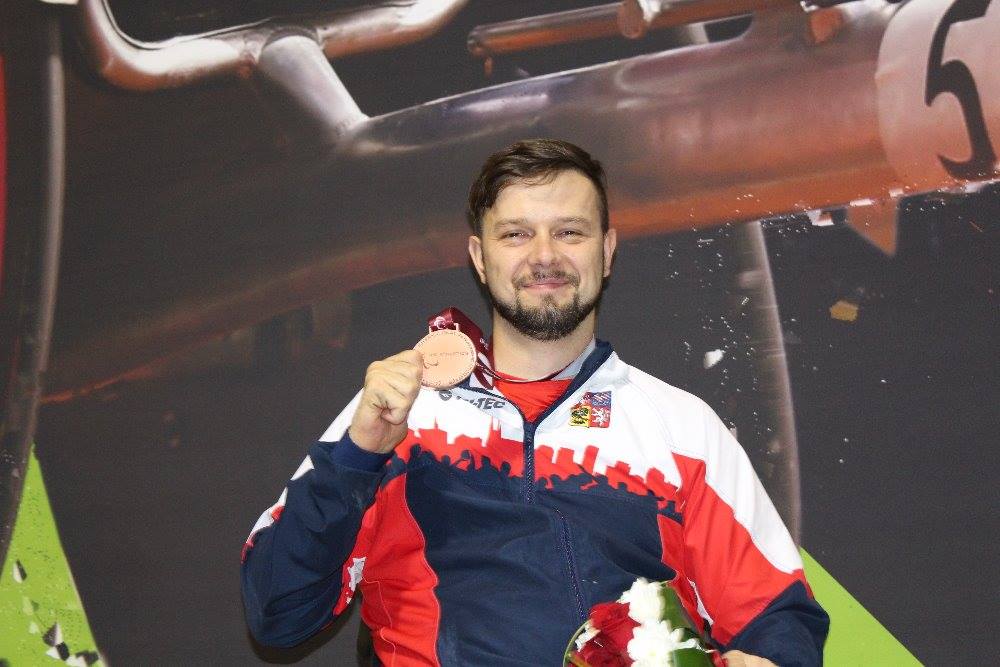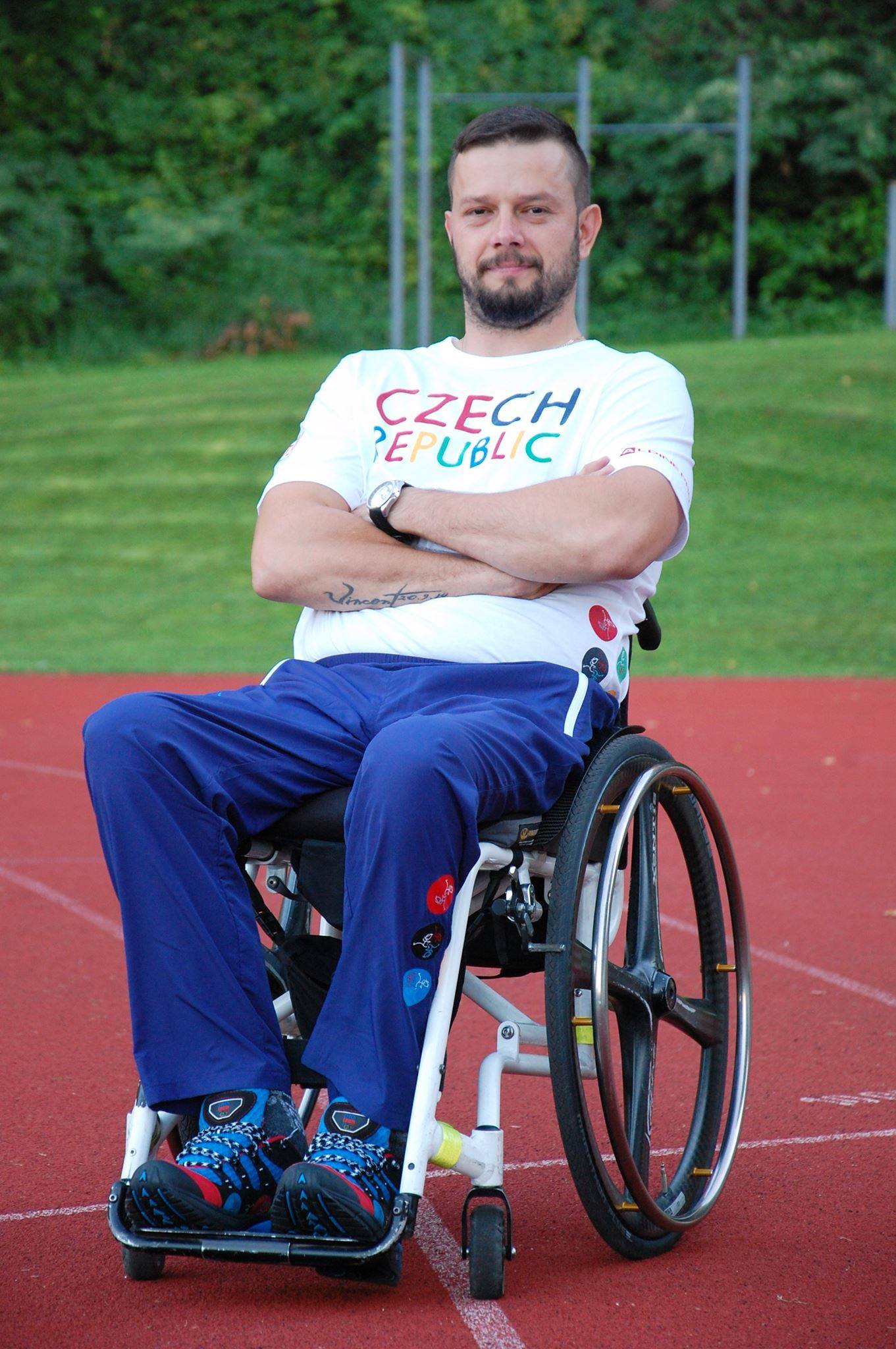As a boy he played at the swimming pool. And that was it - a damage to the cervical spine, paralysis of his legs and arms. Despite this, goblets and medals from the European Championships and the World Championships proudly shine at his home. As he says, he is still waiting for the Paralympic one. When he doesn’t train himself, he trains the wheelchair team of rugby players. And he will not be missing the Emil Open 2020 either. He is the ambassador of athletics.

In the interview for the Czech Radio, you said that life does not end with an injury. Is this your life motto? Do you have an experience with people with disabilities who have this feeling? What helps to remember and trust this motto?
Yes, I did say that. But I can only speak for myself. And maybe for some of my closest friends. If this is my life motto? Not really. I have different personal mottos that motivate me and point me to the right direction. But yes, life really does not end with an injury. It is just another chapter of our life and it is up to each of us how we handle it. We either fight or we don’t. I chose to fight. And what helps? Usually family and close friends. Beginnings are very difficult. Even though it is way easier these days than it was 20 years ago. There are many treatment and integration options and it goes further and further every year. And that is incredible.
You were not born with a handicap. It happened at the swimming pool. It must have been a shock for you. The inner “setting” you were talking about above was applied immediately?
No, it was not. It took a long time until I came to it. Many years. At the beginning, you just don’t know what is going on and what will happen. It was crazy. Everything you had, you expected and what seemed absolutely natural turns 180 degrees in just one day. In fact, you have to start a completely new life, from scratch. From common needs, such as eating, getting dressed, going to the toilet and so on. That is not pleasant. Not at all for a boy at the age of 18, who has his life lined up in dreams and big plans. It took a very long time for me to put up with it. Well, to be honest, I have never fully put up with it. It kind of somehow went away. It fell silent. Time is the best doctor.
Aleš, you are a successful paralympian. Can you tell me how many paralympics have you attended?
Four. The first was in Athene, Greece in 2004, then 2008 Peking, China, 2012 London, England and the last one was 2016 Rio de Janeiro, Brazil. I was meant to fly to my fifth paralympic in Tokyo. Unfortunately, COVID cancelled it. We will see if it takes place in the following year 2021.
I will keep my fingers crossed. Tell me, do you remember your feeling when you won your first medal?
First medal? Very vaguely. But when I think about it, I actually do. Netherlands, Assen. I think it was the World Championship. I think I won a silver medal. It was a shock. First competition and immediately a silver medal at the World Championship. I know it was a futile performance. I was under one and half meters behind my current maximum. But it was enough. I know that when I was at the podium, all I wanted was for them to play me the national anthem. This will be the best reward.
Your successes probably bring with them a demanding preparation. What does your training look like during the year?
My training is very demanding. Especially time wise. The point is, we are not full time professionals like healthy athletes. We have to go to work, pay rents, mortgages, credits, look after families etc.. And then, after work, we can do sports. I cooperate with very nice people who help me a lot. I mean my personal trainer Martin Tejkla, who is with me at training almost every day. Whether it is a gym or the athletics itself, only if I am not at the rugby training. I tend to train at least five times a week. There are weeks when I have to train every day, for example when there are competitions or rugby matches at the weekend. Which can be said about this June, July, August and September. But it should calm down after that. At least a little bit.
What do you do when you do not train? How do you spend your free time?
When I don’t train and when it is possible, I am with my six year old son. Unfortunately, we do not live together. He is with his mum in Brno. But when it is possible, I take him to my place in Trutnov. At least for a few weeks. It is easier over the holidays, I can have him here longer. Otherwise, when I don’t train, I work or I have university exams as I do distance learning in Prague. There is always something to do.
You yourself are a coach and you lead a team of rugby wheelchair riders - Captain WRT. What do the members of the team usually fight?
What do they fight? Me! (hahah)
No, kidding. When talking about sport, then there are two main things. Time and money. Most boys/men are at the age when they have families. So the time is demanding. Our team consists of boys who are spread all over the Czech Republic. We train in Hradec Králové but they boys are from Prague, Lysá nad Labem, Pardubice, Brandýs, Nové Město na Moravě, Rychnov nad Kněžnou, Trutnov or Mladá Boleslav. And I am not even talking about the ones from other teams who come to train with us. So it is not easy to find a date that would work for everyone. So we had to reduce it to one 3hour long training a week and that is on Friday evening. That was the only option. Well...and money. This sport is expensive. I am not only talking about the hall rental or weekly assembly. The main expense of this sport is the purchase of a new wheelchair which is around 150 to 250 thousands czech crowns per piece. And that is the problem. Nobody gives us this money (I mean the state). We have to ask various foundations, companies, associations, organizations, friends etc. There is no other option.
How do you think the sport for the disabled is perceived in the Czech Republic?
It is better than it used to be for example ten and more years ago. But there is still a lot to learn from other countries. Unfortunately, a very small amount of money is spent on sports for the disabled. If you take into account that around eight billion crowns go into sports as such in the Czech Republic and about hundred millions go into sports for the disabled, then it is not surprising at all. People don’t usually do sports because they cannot afford it and the state does not give it to them. The media coverage is minimal. The fact that the Paralympic magazine runs on Czech TV once a month does not really bring spectators and it does not get into the greater awareness of people. And in the end, the years of quarrels between the sports associations and the Czech Paralympic Committee do not help. It’s a vicious circle. Unfortunately.
You are the ambassador of athletics at Emil Open 2020. How do you perceive this event?
It is a great honor for me. I have never held such a position at this event. It is a completely new experience for me and I am looking forward to it. I just hope I don’t make any mistakes. We’ll see.
I am sure you won’t. Where can people meet you during Emil Open 2020?
It will be a bit difficult on Wednesday. I will moderate the opening of the games together with Katka Nekolná from 4pm in the complex of the Technology University in Brno. Then we leave for work to see the mayor and then I am expected at 7pm at mr. Jan Kraus at the Radost Theater in Brno. So Wednesday will be very difficult. On Thursday, I should spend the whole day with the athletes in the complex of the University of Technology. I am really looking forward to it!
